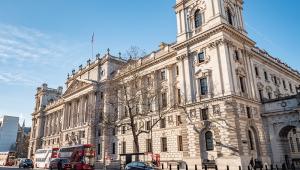By Lucy Phillips
11 December 2009
The chancellor failed to account for £15bn worth of public spending cuts from 2011/14 in Wednesday’s Pre-Budget Report, according to the Institute for Fiscal Studies.
The independent think-tank said government departments faced a shortfall of £36bn, or 19.2%, over the next Spending Review. While Alistair Darling claimed £21bn of savings through efficiencies, tighter control of public sector pay and pensions and cuts to lower priority budgets, the rest of the deficit remained unaccounted for.
‘We don’t yet know which departments are going to get that £15bn spending cut. We don’t know if that will be [through] less public services or continued efficiencies,’ said IFS senior research economist Gemma Tetlow, who predicted public spending would return to 1997 levels by 2017.
Speaking at a post-PBR briefing on December 10, Tetlow also warned that cuts to areas such as defence, higher education, transport and housing would be more severe because of the protection given to spending on health, children and schools and overseas development in the PBR. The savings already claimed by the government were also likely to be smaller because any efficiencies made in the NHS would be recycled in its budget, she added.
Robert Chote, director of the IFS, added that an ‘awful lot of detail’ had yet to be filled in. It was difficult for the chancellor to blame this on uncertainties ahead when he had already been so specific in some areas.
The IFS also warned that the plans contained in Labour’s new Fiscal Responsibility Bill, committing the government to halving its deficit within four years, were ‘not sensible fiscal rules’. The Treasury had a one in four chance of breaking them, including the requirement for borrowing in 2013/14 to be no more than half the level of 2009/10, and for borrowing to fall every year to 2015-16.
The think-tank was also critical of the Conservatives, saying that even if the party came to power and delivered its planned £7bn efficiency savings on top of those already proposed by Labour, £10.4bn of cuts would still be unaccounted for. This could rise to £21.4bn if they did not adopt any of the current government’s efficiency plans. Shadow chancellor George Osborne has so far only pledged to protect two areas of spending – the NHS and overseas development.
The Institute for Government yesterday published guidance on
how the government should create ‘a credible plan’ to deal with fiscal
consolidation. The think-tank
advocated the model used by Canada to eliminate its public deficit between 1994
and 1999. The biggest savings
could be made through tax rises, benefit reductions, wage controls and new
charges for existing services.


















